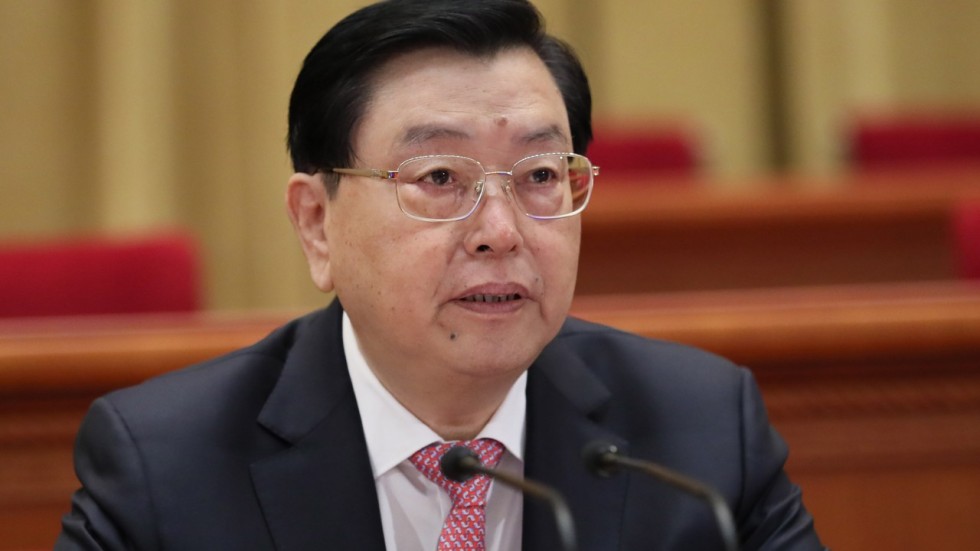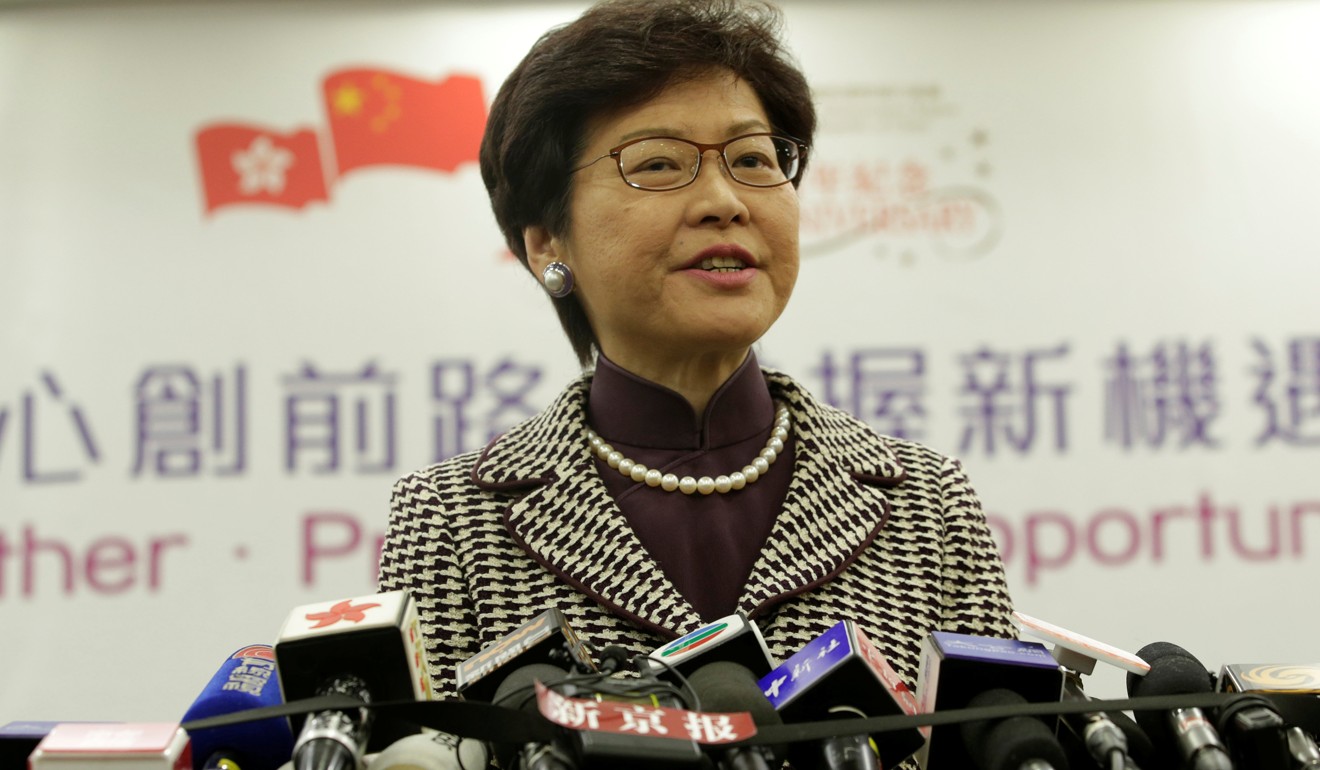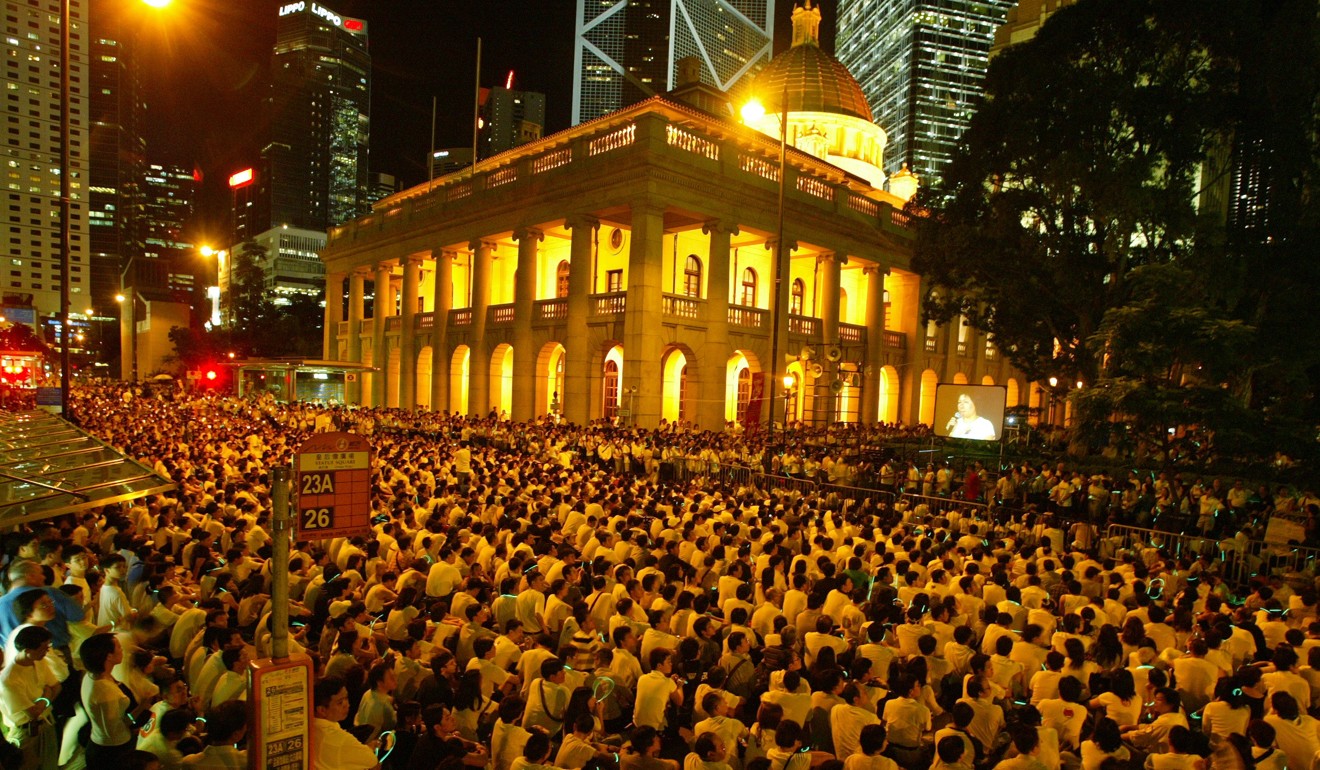Hong Kong handover 20th anniversary
Chinese state leader Zhang Dejiang announces Beijing’s plans to tighten grip on Hong Kong
NPC chief calls on city to enact controversial national security legislation

Stuart Lau
China’s No 3 state leader on Saturday warned Hong Kong not to confront the central government over the “high degree of autonomy” it was promised and that it must enact its own national security laws, as he laid down Beijing’s sternest and most detailed strategy for the city in recent years.
Zhang Dejiang announced that Beijing would “go into further details” about consolidating its sovereignty over Hong Kong in several areas, such as the pace of political reform, its power over the chief executive, and its authority to appoint and dismiss key officials.
The head of the National People’s Congress also rejected the notion of separation of powers in Hong Kong.
Bar Association chief warns against making Basic Law interpretations by Beijing ‘standard practice’
Speaking in the Great Hall of the People on the coming anniversary of Hong Kong’s handover from Britain to China, Zhang defined the chief executive’s role in the city as the “core” of an executive-led political system.
“Hong Kong’s political structure is neither separation of powers nor led by the legislature or judiciary. It is an executive-led one, with the chief executive as the core,” he said.

He called on judges and officials to “take the lead to learn the Basic Law”.
HONG KONG NEWS
Get updates direct to your inbox
E-mail *
By registering you agree to our T&Cs & Privacy Policy
Under Article 23 of the city’s mini-constitution, China enjoys “comprehensive” sovereignty over the city, said Zhang, who is chairman of the National People’s Congress and the Communist Party’s working group on Hong Kong.
He added that calls for self-determination or Hong Kong independence were attempts to shun that sovereignty.
“In recent years there were ... attempts to turn Hong Kong into an independent or semi-independent political entity, breaking it away from the country,” Zhang said.
“One cannot turn a blind eye to such acts, and the [Hong Kong] special administrative region should steadfastly implement the constitutional obligation of national security under the Basic Law.”

Chief executive-elect Carrie Lam Cheng Yuet-ngor on Saturday reiterated her election manifesto stance that while legislating Article 23 was a constitutional obligation, “past experience tells us that the subject is highly controversial and could easily cause social disturbance”.
The last attempt to enact the contentious legislation, in 2003, brought half a million Hongkongers out on the streets in protest.
All Hong Kong underground spaces ‘belong to China’, Basic Law expert says
Speaking months after Hong Kong’s second and third highest-ranking officials clashed in the chief executive race, Zhang said it was necessary for the city’s governing team to be made up of “patriots who sincerely support [China’s] sovereignty”.
The Basic Law also promises the city a “high degree of autonomy.”
During his 50-minute speech on Saturday, Zhang addressed that autonomy directly, saying: “The relationship between the central government and Hong Kong is that of delegation of power, not power-sharing.
“Under no circumstances should the central government’s powers be confronted in the name of a high degree of autonomy.”
Observers were divided on the effect Zhang’s comments would have on future policy.
Professor Lau Siu-kai, vice-chair of a leading Beijing-based think tank on Hong Kong, said Zhang’s overall remarks were not new, while his call for national security laws was more like “saying it as a matter of principle”.
But Johnny Lau Yui-siu, a veteran China commentator, voiced concern over Zhang’s suggestion that Beijing would assess the ability of Hong Kong officials to support the Basic Law and to pledge allegiance to the nation and the city.
This article appeared in the South China Morning Post print edition as:
Beijing signals tighter grip
www.fotavgeia.blogspot.com
Chinese state leader Zhang Dejiang announces Beijing’s plans to tighten grip on Hong Kong
NPC chief calls on city to enact controversial national security legislation

Stuart Lau
China’s No 3 state leader on Saturday warned Hong Kong not to confront the central government over the “high degree of autonomy” it was promised and that it must enact its own national security laws, as he laid down Beijing’s sternest and most detailed strategy for the city in recent years.
Zhang Dejiang announced that Beijing would “go into further details” about consolidating its sovereignty over Hong Kong in several areas, such as the pace of political reform, its power over the chief executive, and its authority to appoint and dismiss key officials.
The head of the National People’s Congress also rejected the notion of separation of powers in Hong Kong.
Bar Association chief warns against making Basic Law interpretations by Beijing ‘standard practice’
Speaking in the Great Hall of the People on the coming anniversary of Hong Kong’s handover from Britain to China, Zhang defined the chief executive’s role in the city as the “core” of an executive-led political system.
“Hong Kong’s political structure is neither separation of powers nor led by the legislature or judiciary. It is an executive-led one, with the chief executive as the core,” he said.

He called on judges and officials to “take the lead to learn the Basic Law”.
HONG KONG NEWS
Get updates direct to your inbox
E-mail *
By registering you agree to our T&Cs & Privacy Policy
Under Article 23 of the city’s mini-constitution, China enjoys “comprehensive” sovereignty over the city, said Zhang, who is chairman of the National People’s Congress and the Communist Party’s working group on Hong Kong.
He added that calls for self-determination or Hong Kong independence were attempts to shun that sovereignty.
“In recent years there were ... attempts to turn Hong Kong into an independent or semi-independent political entity, breaking it away from the country,” Zhang said.
“One cannot turn a blind eye to such acts, and the [Hong Kong] special administrative region should steadfastly implement the constitutional obligation of national security under the Basic Law.”

Chief executive-elect Carrie Lam Cheng Yuet-ngor on Saturday reiterated her election manifesto stance that while legislating Article 23 was a constitutional obligation, “past experience tells us that the subject is highly controversial and could easily cause social disturbance”.
The last attempt to enact the contentious legislation, in 2003, brought half a million Hongkongers out on the streets in protest.
All Hong Kong underground spaces ‘belong to China’, Basic Law expert says
Speaking months after Hong Kong’s second and third highest-ranking officials clashed in the chief executive race, Zhang said it was necessary for the city’s governing team to be made up of “patriots who sincerely support [China’s] sovereignty”.
The Basic Law also promises the city a “high degree of autonomy.”
During his 50-minute speech on Saturday, Zhang addressed that autonomy directly, saying: “The relationship between the central government and Hong Kong is that of delegation of power, not power-sharing.
“Under no circumstances should the central government’s powers be confronted in the name of a high degree of autonomy.”
Observers were divided on the effect Zhang’s comments would have on future policy.
Professor Lau Siu-kai, vice-chair of a leading Beijing-based think tank on Hong Kong, said Zhang’s overall remarks were not new, while his call for national security laws was more like “saying it as a matter of principle”.
But Johnny Lau Yui-siu, a veteran China commentator, voiced concern over Zhang’s suggestion that Beijing would assess the ability of Hong Kong officials to support the Basic Law and to pledge allegiance to the nation and the city.
This article appeared in the South China Morning Post print edition as:
Beijing signals tighter grip
www.fotavgeia.blogspot.com

Δεν υπάρχουν σχόλια:
Δημοσίευση σχολίου